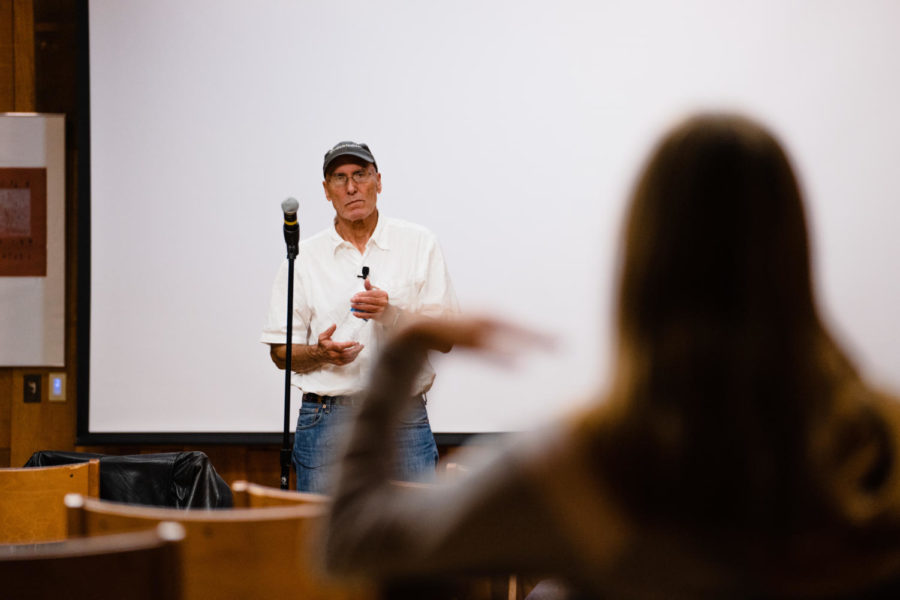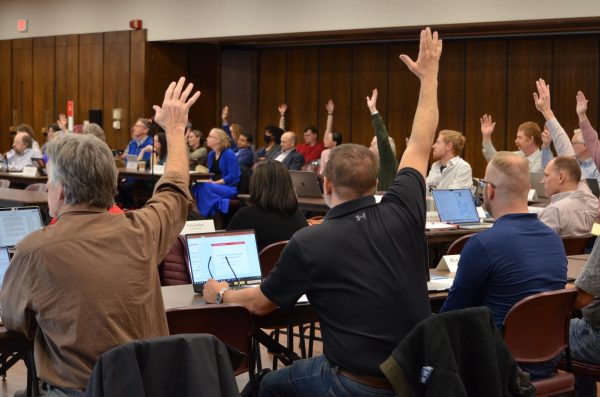Candidates for governor and fourth district race come to campus
Rick Stewart interacting with observers at the Town Hall Lecture series.
During the Lecture Series Town Hall, the two individuals running against incumbent Rep. Randy Feenstra and Iowa’s libertarian candidate for governor spoke to constituents about their campaign platforms. Issues ranged from abortion rights to the two-party system.
Candidates for Monday’s town hall are all running in races where the incumbents are favored in the polls, which included Ryan Melton, Rick Stewart and Bryan Jack Holder, according to reporting from the Des Moines Register and Project FiveThirtyEight.
Rick Stewart
Libertarian Gubernatorial Candidate Rick Stewart shared with the audience how his extensive experience in travel, business, law enforcement and politics has led him to run for governor of Iowa.
As a third-party candidate, Stewart believes he has the unique opportunity to represent the true will of the people instead of trying to fit the mold of either Democrat or Republican.
“They all wear masks, one mask says Republican, the other mask says Democrat,” Stewart said. “They don’t get to say anything from the heart.”
Stewart also believes that Iowa has a high volume of non-partisan registered voters because many Iowan voters do not feel comfortable aligning themselves with a single party.
Stewart said despite his own pro-life philosophy, he believes in the right to an abortion for Iowans. He also shared his opinion on firearm deaths. Stewart said the legalization of suicide and the ending of the War on Drugs would prevent firearm deaths because these weapons are often used in times of violence or self-harm.
Stewart also acknowledged the teacher shortage and proposed that educators in the future should not be required to obtain a formal education if they have gained relevant work experience.
Stewart believes, as a third-party candidate, his likelihood of winning a majority of the votes is slim but would be revolutionary in American politics, as Libertarian officials are elected less frequently.
“If I win this race, it would shake the bones of the country,” Stewart said. “It would have an enormous impact, and it is not going to happen.”
Bryan Holder
Liberty Caucus member Bryan Jack Holder, who is running for representative of Iowa’s fourth congressional district, discussed the conflicts he has experienced as a third-party politician in the midterm election. Holder said he has struggled to gain the television and media attention that his opponents, Melton and Feenstra, have already been granted. Holder said he has been denied the opportunity to take part in televised debates regarding the election.
Holder said the best way for Iowans to gain fair representation would be to split the four congressional districts into three subsections within the districts. Holder believes that by reconsidering the size of the constituency and petitioning to put more seats in the House of Representatives, fair representation will be achieved.
“They stopped adding seats to the U.S. House roughly about 1929,” Holder said. “Back then, Iowa had eleven congressional districts, but now we only have four.”
The fourth district is now made up of nearly 800,000 constituents, which Holder believes has made it difficult for people to relate to those within their districts because they are so large.
Holder stated by providing the people with the opportunity to become more involved in their district and have their opinions considered, he is giving them a voice outside of the typical two-party system.
“I don’t want to be the judge, I don’t want to be the lawyer,” Holder said. “I want to be like the jury for you.”
All candidates on the ballot were invited to this event. Further details on this lecture series can be found on the Iowa State Lecture Series website.
Ryan Melton
Melton is the Democratic candidate running to represent Iowa’s fourth congressional district.
Melton discussed his unconventional decision to run to represent Iowa’s fourth district and explained that as he waited for a Democrat to appear on the ballot, he felt the need to get involved.
“My initial interest revolved more around who was going to run next, not thinking that person would be me,” Melton said.
Melton continued to explain the hurdles he has witnessed that prevent Iowans from staying in the fourth district and the state in general. Melton believes that deficits in childcare, the current minimum wage, the teacher shortage and the cost of education are causing extra hurdles for Iowa families.
“It really feels like they are amplifying those obstacles instead of tearing them down,” Melton said. “They are amplifying the reason why our young people are leaving, and in turn, why many of our parents and grandparents are leaving.”
To Melton, this election is important because democracy is currently up for debate. He discussed how Feenstra spoke about the Jan. 6 controversies, his tendency to vote against gun safety legislation and his choice not to engage in public debates.
“I don’t believe my opponent believes half the words he says,” Melton said.
Melton listed reasons why voters should choose to vote for him in this election rather than Feenstra, which include his engagement with Iowans throughout the election, his plan to address the current controversies surrounding Iowan education, his plan to prevent carbon capture pipelines and his stance on reproductive rights which allows more access to abortions.
Your donation will support the student journalists of the Iowa State Daily. Your contribution will allow us to purchase equipment, send our student journalists to conferences and off-set their cost of living so they can continue to do best-in-the-nation work at the Iowa State Daily.













